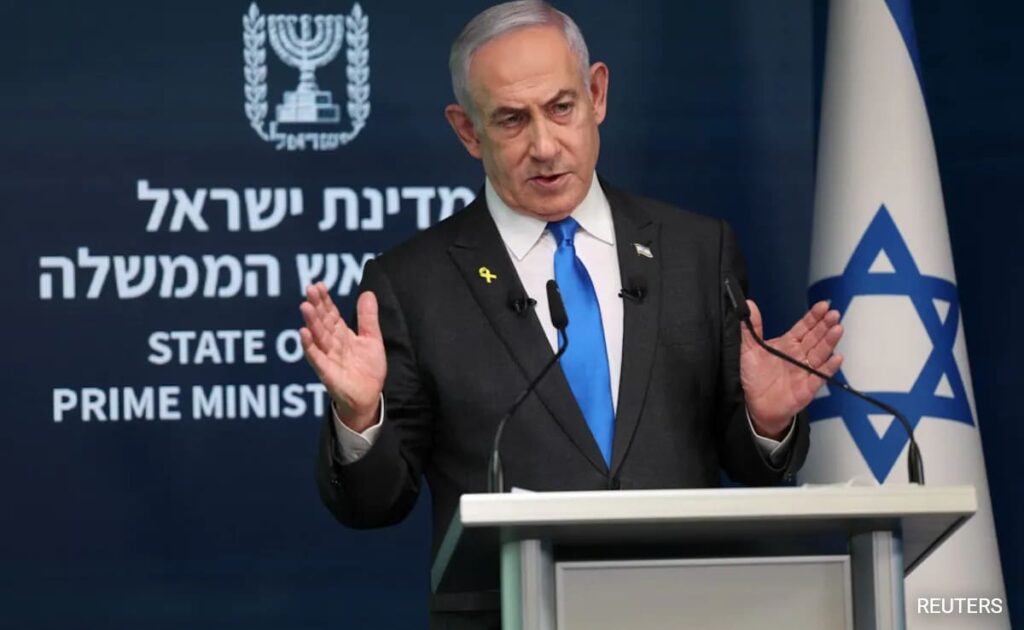Tel Aviv:
In a significant development in West Asia, Israel has agreed to a ceasefire with Lebanon. The agreement will enter into force at midnight on November 27th (Israel time).
The Israeli government’s highest decision-making body, the Security Cabinet, agreed to a ceasefire. “The duration of the ceasefire will depend on what happens in Lebanon. We will implement the agreement and respond strongly to any violations. We will remain united until victory,” Prime Minister Benjamin Netanyahu said in a speech after the agreement.
“We will complete the mission of annihilating Hamas, bring home all the hostages, ensure that Gaza is no longer a threat to Israel, and return the northern population safely. The war is not over until it is over.” is aware of all its goals, including the safe return of the northern population, and that will definitely happen, just as it happened in the south,” Netanyahu added.
He listed three reasons why Israel agreed to the ceasefire.
“The first reason is to focus on the Iranian threat, so I won’t go into detail about that.
The second reason is to give the troops some breathing room and replenish their reserves. And it’s no secret that there are significant delays in the delivery of arms and ammunition. These delays are expected to be resolved soon. We will receive a supply of advanced weaponry that will keep our soldiers safe and give them more offensive power to accomplish their missions.
The third reason for the ceasefire is to separate the front lines and isolate Hamas. From the second day of the war, Hamas expected Hezbollah to fight on its side. With Hezbollah no longer present, Hamas will be isolated. We will increase pressure on Hamas, which will aid in the sacred mission of freeing the hostages. ”
Israel and the Iranian-backed militant group Hezbollah, based in Lebanon, have been at war for months. Hezbollah began attacking Israel with rockets and projectiles more than a year ago, leading to retaliation from Tel Aviv. Hezbollah supports Hamas, another militant group backed by Iran, which it considers an ally.
Israel and Hamas have been at war since October 2023, when terrorists breached the Israel-Gaza border and took Israelis hostage at a concert. Hamas is based in Gaza, where the war began after Israel retaliated against terrorist attacks. Since then, wars in West Asia, commonly referred to as the Middle East, have caused massive destruction and the death of tens of thousands of people in the region.
Israeli Prime Minister Benjamin Netanyahu has agreed to a ceasefire, as has his security cabinet.
However, Prime Minister Netanyahu warned that if Hezbollah breaks the agreement, Israel will not abide by the agreement and will fight back with all its might. The peace agreement was reached with the intervention of the United States and France, and is expected to be formally announced by US President Joe Biden and French President Emmanuel Macron soon.
US Secretary of State Antony Blinken is working closely with Israeli officials to negotiate a ceasefire that will take effect at midnight tonight.
Key points of the Israel-Lebanon ceasefire agreement are:
Hezbollah and all other armed extremists in Lebanese territory will not carry out any offensive operations against Israel. In return, Israel will not conduct any offensive military operations against Lebanese targets (land, air, or sea). Israel and Lebanon, the importance of UN Security Council Resolution 1701. These commitments do not negate Israel’s or Lebanon’s right to exercise its natural right of self-defense. Official Lebanese Security Forces The army is the only armed group allowed to carry weapons and operate troops in southern Lebanon. The sale, supply and production of arms and related materials in Lebanon is subject to supervision and control by the Lebanese government. Production of weapons and related supplies will be abolished. All unauthorized infrastructure and military installations will be dismantled and all weapons that do not comply with these commitments will be confiscated. A commission acceptable to both Israel and Lebanon will be established. Israel and Lebanon will report potential violations of these commitments to the Committee and UNIFIL. Lebanon will deploy official security forces and military forces along all borders, crossroads, and demarcation lines. Israel will gradually withdraw from areas south of the Blue Line within a period of up to 60 days. The United States facilitated indirect negotiations between Israel and Lebanon on a recognized land boundary agreement.



